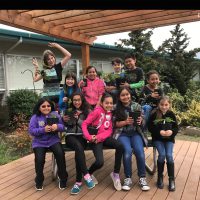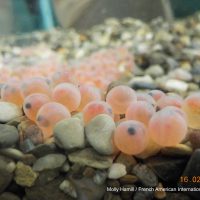*This is an excerpt from an article written by Cindy Hudson at blog.nwf.org.
Winter and spring in Oregon can be cold, wet and muddy, but thanks to seed grants from the National Wildlife Federation (NWF), ten schools in the Portland area are learning the joys of getting outside and getting their hands dirty despite weather conditions.
Part of the National Wildlife Federation’s Eco-Schools USA program, the $1,000 seed grants are funded by the Gray Family Foundation. The grants are used for green school projects like the one at Beaverton School District’s McKinley Elementary School. McKinley is using the seed grant to purchase native plants such as wildflowers, ferns, herbs and shrubs as well as plant tags, ID books, soil, mulch, garden chairs, and a mason bee condo. In honor of Earth Day later this month, students, parents, staff and volunteers will be planting 200 trees on the school’s extensive grounds as part of their efforts as a Certified Schoolyard Habitat.
A few miles away at French American International School (FAIS), Science Lab Instructor Molly Hamill says pathways available through Eco-Schools USA are helping teachers provide the curriculum that connects students to the outdoors and tie together the whole community.
Hamill also says information from Eco-Schools USA makes it easy to tie in what’s being taught in the classroom to further learning. “We have freedom to pull in ideas and involve kids and go from there,” she said.
In mid February, Molly Orr, AmeriCorps member with ANWS and NWF delivered 500 rainbow trout eggs to a 20-gallon aquarium the school purchased with grant funds. For two weeks, Hamill says the aquarium became the most popular site on campus, providing learning opportunities for both students and adults.
“We had kids checking the pH, temperature and the conditions of the fish,” said Hamill. “First graders journaled about the progress and recorded changes in what they saw.”
When the trout were large enough, staff released them into a local pond approved by ODFW. Now that the school has the equipment, Hamill hopes to sign up for the program again in the fall, when Chinook salmon eggs will be available.
That kind of enthusiasm and continuity of learning is exactly what Morgan Parks, Oregon education coordinator for the National Wildlife Federation, loves to hear. “School budgets are stretched thin,” said Parks. “Because the (Eco-Schools) pathways are linked to curriculum standards, it can help take the load off teachers.”
Parks said other schools receiving grants are working on a variety of pathway projects, including removing invasive species and replacing them with native plants, creating monarch butterfly gardens and community gardens, performing energy and waste audits, and developing a bioswale on school grounds.



